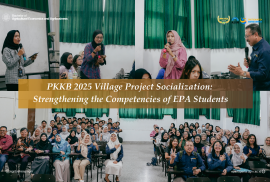Yogyakarta, November 26, 2025 – The Agricultural Economics and Agribusiness Study Program, Faculty of Agriculture UGM, held a Guest Lecture for the Agribusiness Management Course, featuring Prof. Wirawan Dony Dahana from The University of Osaka, Japan, as the guest speaker. This guest lecture, themed “Consumer Behavior,” aimed to enhance students’ understanding of modern marketing dynamics, particularly regarding consumer behavior in the digital age.
In his presentation titled “Marketing in the Digital Age: The Role of Media Multitasking and Word of Mouth,” Prof. Dony introduced the concept of Media Multitasking (MM), which refers to the simultaneous use of two or more media and its impact on advertising effectiveness, consumer visits to sales sites, and purchasing decisions. He emphasized that the influence of MM is not always negative. Research results show that the impact of multitasking greatly depends on consumer motives, such as efficiency, control over information, information needs, and habits. Analysis using a latent model shows that each motive produces different responses to advertising exposure, advertising repetition frequency, and media consumption context.










